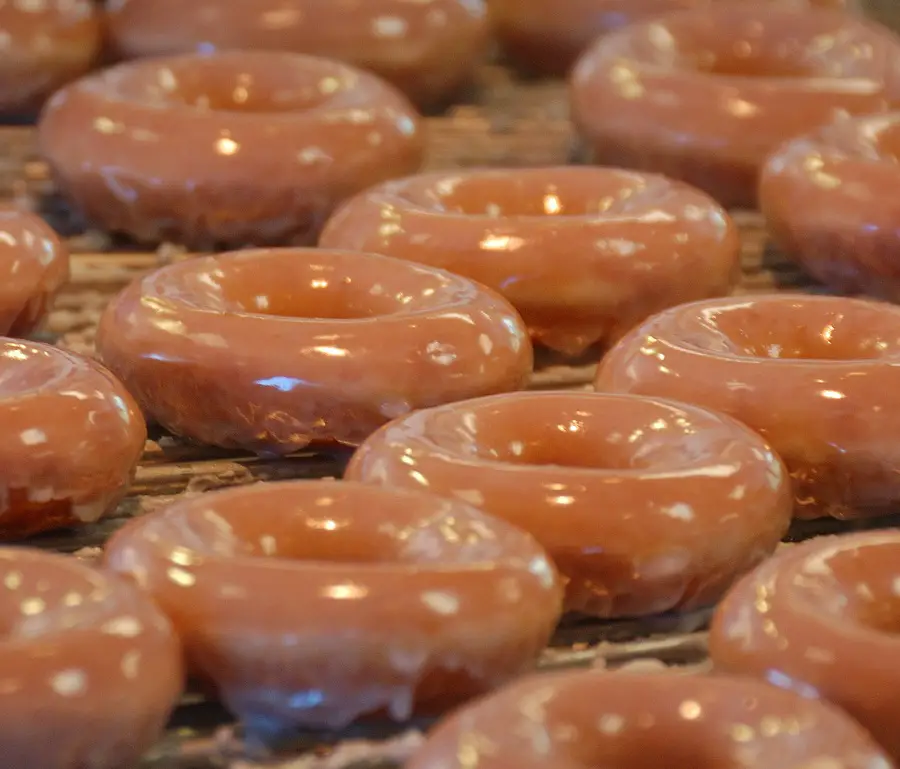Like beautiful clouds against a bright blue sky, our fondest, unfulfilled dreams often shift and subtly change shape — but never substance. Circumstances, time, and new insights all have a way of gently reshaping the “clouds” we chase. But the heart of those clouds, the basic ideas and areas of our greatest goals and dreams, usually remain intact.
When you have a good idea, stick with it — even through tough times. And if you do one single thing really well, and profitably, stay focused on that avocation, item, area. When you finally get something right, don’t change it. Innovate all around it, finding new ways to use it, promote it, share it, market it — but why change the core vision as long as it’s viable?

Some things, we’re happy to say, don’t change. These things were fine from the beginning, and they’re still pretty wonderful. So why tamper with success? Vernon Rudolph understood this; since 1945, times have changed, but his delicious signature “Original Glazed Doughnut” has been a constant comfort food.
Vernon Carver Rudolph was born in Marshall County, Kentucky. In 1933, at age 18, Vernon began working for his uncle who owned a small general store in Paducah, Kentucky. That same year, Vernon’s uncle, Ishmael, had purchased a secret recipe for yeast-raised doughnuts from a New Orleans chef who was working on an Ohio River barge, and was famous for his light and fluffy doughnuts. Although Ishmael’s store sold a wide variety of goods, it was his delicious doughnuts that brought the customers in. A good thing, which helped the business to weather the Great Depression.
In the summer of 1937, Vernon started pursuing his dream: he was determined to own his own store, and specifically a doughnut shop. He moved to Winston-Salem, North Carolina and rented a building in what is now the historic Old Salem district. He started off by making and selling his doughnuts to local grocery stores.

Each night between the hours of midnight to around four in the morning, the streets were filled with the intoxicating aroma of fresh doughnuts baking. To say that Vernon’s industry was disturbing the public peace would be an understatement. Neighbors started knocking on the door at obscene hours, asking if they could buy hot doughnuts. So, Vernon decided to cut a hole in a side wall of his shop, and started selling warm glazed doughnuts directly to customers on the sidewalk. But mind you, the warm doughnuts were only available during the wee hours of the night. We’re not positive, but there’s a good chance that Vernon not only created one of the first fast food service windows, but also got people addicted to the nightlife!
More innovations continued. In the early 1940s, Vernon started selling franchises. By 1944, he was selling a large variety of cake doughnuts in addition to the “Original Glazed Doughnut,” and he decided to implement a devious new method to torment his clientele: he realized the unused space beneath the service counter could be put to better use; so he installed display cases showing off his frosted temptations.
In 1947, Vernon founded the Krispy Kreme Corporation, and trademarked the familiar green and red bowtie logo, which had been designed for him by a local architect. In 1955, Krispy Kreme started a fundraising program which allowed schools and churches to purchase and resell doughnuts, helping these organizations to buy books, uniforms and needed equipment.
In 1963, Krispy Kreme went from hand making doughnuts to automated production — but the recipe stayed the same, as well as the taste. Vernon Rudolph continued to innovate around his core idea, his original delicious doughnuts — unchanged through decades of marketing and expansion. Today, Krispy Kreme is known internationally, with stores in Canada, South America, the Dominican Republic, and almost 100 donut shops in Mexico alone. But wherever you go, Vernon’s standard of excellence is enforced, “…Impeccable presentation is critical wherever Krispy Kreme is sold….”
Determination can be delicious, and presentation powerful. But never change a good thing. Market and innovate around it. Find your passion and stick with it!
“God wouldn’t change his plan. He wanted to make this perfectly clear to those who would receive his promise….” (Hebrews 6:17 GOD’S WORD)
